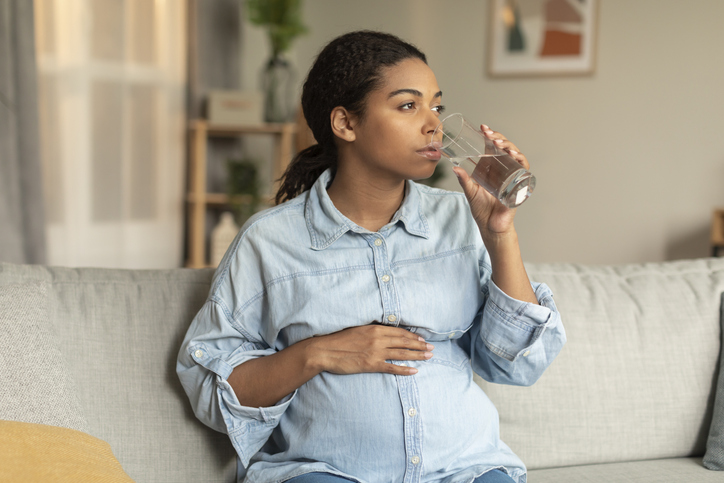It’s Time To Prioritize Black Maternal Mental Health

Source: Prostock-Studio / Getty
We need to discuss perinatal mood and anxiety disorders (PMADs) and their effect on maternal mental health. This is a leading complication for pregnant and postpartum women, with 1 in 7 experiencing these issues. However, for me, as a Black woman, the rates are even higher. Studies show that 40 percent of Black birthing people experience maternal mental health symptoms. Yet, despite how common these issues are, Black women are less likely to receive treatment due to various barriers, including stigma, fear and low availability of services staffed by Black providers.
Furthermore, the deterioration of our collective villages exacerbates this issue. As a result, Black women often find themselves parenting alone or with minimal support. As new parents, we should have a flock of knowledgeable, supportive women on deck to help us navigate the challenges of parenthood. However, with the added stress of a PMAD, the lack of support can be devastating. We deserve to be supported and loved.
It’s time that the healthcare system recognizes the critical importance of mental health during the first 1,000 days of a child’s life, including the emotional, psychological and physical stress that birthing people endure. Unfortunately, these issues often go unaddressed, and after giving birth, we are sent home with a new little person who needs us when we often are without the support we need for ourselves.
It’s unacceptable that Black women struggle to find mental health providers. Even if one or two that take our insurance can be located, there is no guarantee that we’ll click with that person. We need options and social support from professionals and people who know and love us.
Racism and discrimination complicate this issue further. As a result, Black women often go unheard, from our pain in childbirth to mental health and physical conditions postpartum. We need more Black birth workers and mental health providers who understand our unique challenges. Healthcare leaders should be training pediatricians to check in with birthing people during appointments, starting within a week of their child’s birth. Finally, local capacity to care for Black mothers and birthing people must increase.
As a Black woman who works in public health and has experienced perinatal depression and anxiety, I know how difficult it can be to navigate the system. I’m pregnant with my third child. When I recognized the signs of prenatal depression during my first pregnancy, I struggled to find a provider. I had private insurance and knew people, but it was still challenging. When I developed postpartum anxiety, I didn’t have family or many close friends locally to turn to for support.
I remember how I felt watching my parents drive away a week or two postpartum. My husband had returned to work, and I needed to take the baby to an appointment. I was so scared to drive. I thought I would crash or the baby would choke when I couldn’t see her, and I was afraid to tell anyone. When I returned to work, I remember crying in the bathroom every day and obsessively checking the daycare app to ensure I dropped the baby off and didn’t leave her in my car. My anxiety was so high and so real. But I navigated a system that I understood, and I was able to survive. Now I know I’m predisposed to prenatal and postpartum mental health issues when pregnant, so I do my due diligence and find a professional to support me. I recognize that these systems and these choices are not easy or common knowledge for everyone. You shouldn’t have to be trained in this in order to access quality services that you deserve and many need.
It’s time to prioritize Black maternal mental health. We need more resources and support to break down the barriers that prevent us from receiving the care we deserve. So let’s start the conversation and work together to make a change.
Jazmin Rivera is the Managing Director of Programs, Monitoring & Evaluation at BRICK Education Network, a charter management organization based in Newark, New Jersey, which invests in children and their caregivers to relentlessly knock down all barriers to students’ academic success.
SEE ALSO:
Black Maternal Health Week: Baby Dove Shows Us Why Black Doulas Matter
Black Woman-Owned Beauty Brands To Shop And Support For Black Women’s History Month



















